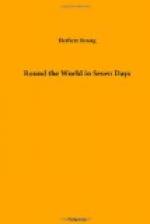“Precisement ca!” said Rodier sympathetically.
For some little time they sailed slowly on, seeking in vain for a rift in the blanket of mist: then Rodier cried suddenly—
“Better take a drop, mister. In three minutes all the petrol is gone, and then—”
“I’m afraid you’re right, Roddy, but goodness knows what we shall fall on. We must take our chance, I suppose.”
He adjusted the planes, so as to make a gradual descent while the engine still enabled him to keep way on the machine, and it sank into the mist. Both men kept a sharp look-out, knowing well that to encounter a branch of a tree or a chimney-stack might at any moment bring the voyage, the aeroplane, and themselves to an untimely end. All at once, without warning, a large dark shape loomed out of the mist. Smith instantly warped his planes, and the machine dived so precipitately as almost to throw him from his seat. Next moment there was a shock; he was flung headlong forward, and found himself sprawling half suffocated on a damp yielding mass, which, when he had recovered his wits, he knew to be the unthatched top of a hayrick.
His first thought was for the aeroplane. Raising himself, and dashing the clinging hay wisps from his face, he shouted—
“Is she smashed, Roddy?”
“Ah, no, mister,” came the answering cry. “She stick fast, and me also.”
Smith crawled to the edge of the rick and dropped to the ground. Two or three dogs were barking furiously somewhere in the neighbourhood. A few steps brought him to the aeroplane, lying in a slanting position between the hayrick and a fence, over which it projected. Rodier had clung to his seat, and had suffered nothing worse than a jolting.
“This is a pretty mess,” said Smith despairingly, “one end stuck fast in the hayrick, the other sticking over the fence: they’ll have to pull it down before we can get her out. Get off, you brute!” he exclaimed, as a dog came yapping at his legs.
“Seize him, Pompey: seize him, good dog!” cried a rough voice.
“Call him off, or I’ll break his head,” cried Smith in exasperation.
“You will, will you?” roared the farmer. “I’ll teach you to come breaking into my yard: I’ll have the law of you.”
“Don’t be absurd, man,” replied Smith, fending off the dog as well as he could. “Don’t you see I’ve had an accident?”
“Accident be jiggered!” said the farmer. “You don’t come breaking into my yard by accident. Better stand quiet or he’ll tear you to bits.”
“Oh, come now!” said Smith. “Look at this. Here’s my aeroplane, fixed up here. You don’t suppose I came down here on purpose? I lost my way in this confounded mist, and don’t know where I am. Just be sensible, there’s a decent chap, and get some of your men to help us out. I’ll pay damages.”
“I’ll take care of that,” said the farmer curtly. “What the country’s coming to I don’t know, what with motors killing us on the roads and now these here airyplanes making the very air above us poison to breathe. There ought to be a law to stop it, that’s what I say. Down, Pompey! What’s your name, mister?”




